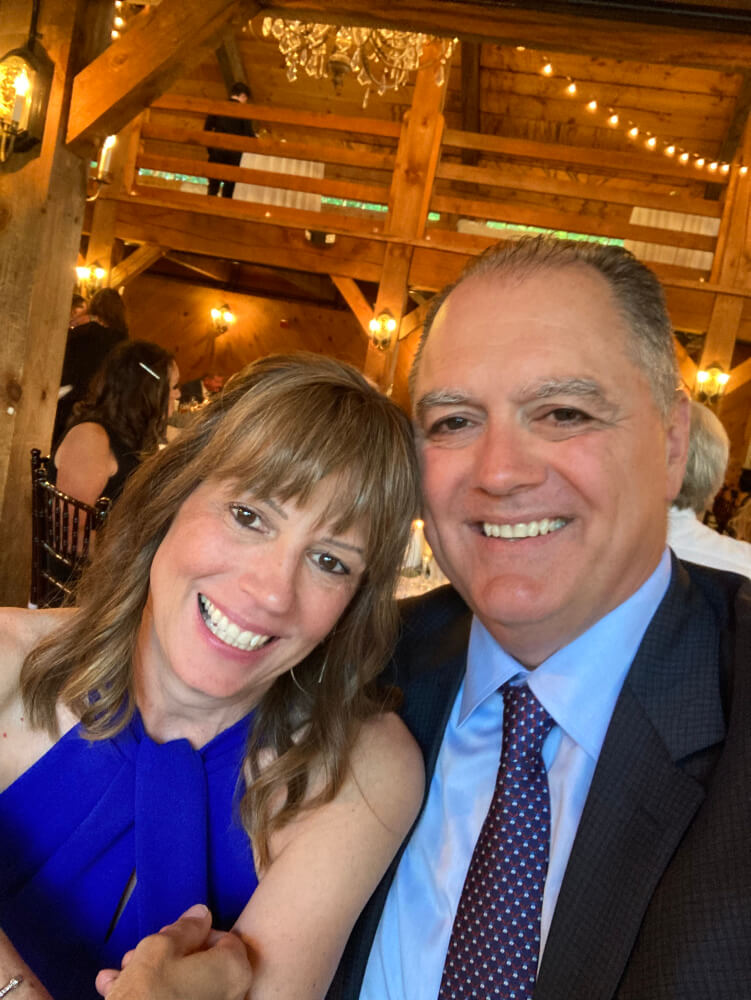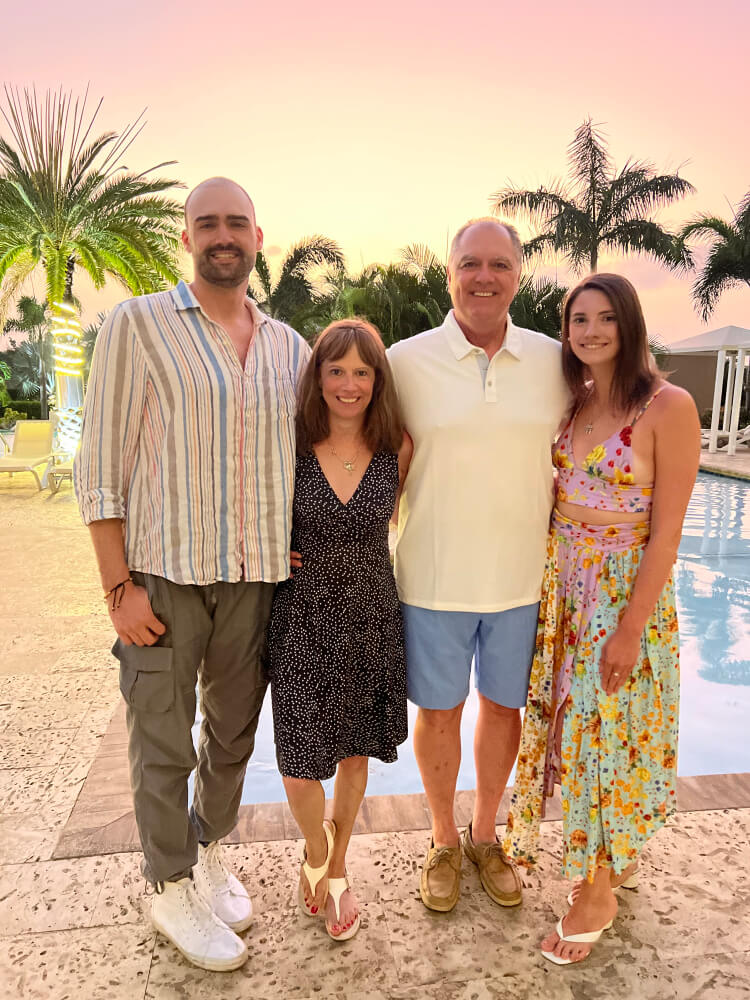Mark Signer uses his voice to raise awareness about anaplastic thyroid cancer — something he thought impossible two years ago. When he was diagnosed with this highly aggressive cancer in July 2020, he was told to get his affairs in order. And when he awoke from the surgery that removed his tumor, he couldn’t speak; one of his vocal cords was paralyzed.
But thanks to pioneering immunotherapy treatment at Dana-Farber and a cutting-edge surgical technique at Brigham and Women’s Hospital, Signer now makes the most of every extra day he has and seizes every possible opportunity to tell people his inspiring story.
A 180-degree turn
Signer still marvels at how quickly his life took a 180-degree turn in July 2020. A financial controller for Citizens Bank, Signer had just enjoyed a few relaxing days at his vacation home on Lake Winnipesaukee, N.H. with his wife, Mary, and their two children. As he drove home to Barrington, R.I., he noticed a lump in his neck.
“I thought it might be a swollen lymph node,” he says.
He was stunned when a local physician suggested another possibility: lymphoma. They’d have to wait a week for his COVID-19 test results to come back before further testing could be done on the lump. Over the following days, however, the lump grew. Signer didn’t want to wait any longer. He drove himself to the emergency room at Brigham and Women’s Hospital, where he received a negative COVID-19 test result within hours.
A CT scan in the ER led to an initial diagnosis: not lymphoma, but thyroid cancer. An analysis of thyroid nodule cells revealed that Signer had anaplastic thyroid cancer (ATC).
“Anaplastic thyroid cancer is one of the most aggressive cancers we encounter in our practice,” says medical oncologist Kartik Sehgal, MD, Signer’s primary oncologist.
The diagnosis shocked Signer.
“I’m a young man, only 58, and had never been sick in my life,” he says. “Things happened so quickly; all of a sudden we didn’t think I would live past Christmas. I had to have really tough conversations with my wife and children. But I approached it as I do everything: Get on it and keep working my way through it. Everything they’d ask me to do, I would do it by the book.”

Turning to the experts
Signer connected immediately with the care team at the Thyroid Cancer Center of Dana-Farber Brigham Cancer Center.
“We’re fortunate to work with these amazing colleagues in thinking about what’s best and what’s important for our patients and how to focus on the whole person,” Sehgal says.
The care team’s prescription for Signer: surgery as soon as possible, followed by a regimen of the immunotherapy drugs nivolumab and ipilimumab.
“Cancer cells put brakes on the immune system,” Sehgal explains. “These drugs remove those brakes so the immune system can recognize and shrink the cancer.”
The surgery, a radical neck dissection, took eight hours. Gerard Doherty, MD, surgeon-in-chief of Brigham and Women’s Hospital and Dana-Farber Cancer Institute, removed 25 lymph nodes in Signer’s neck as well as the tumor, which was wrapped around not only his carotid artery but the nerve leading to one of his vocal folds. As a result, the fold was paralyzed; Signer could no longer speak. This was expected; Dana-Farber had a plan to help him get his voice back.
Three months later, as Signer continued his immunotherapy, he underwent a pioneering surgery with Thomas Carroll, MD, Director of Brigham and Women’s Voice Program. Carroll expanded the paralyzed vocal fold so it would once again touch against its opposite fold to produce sound.
“Within 24 hours of surgery, my voice was back,” Signer says.
Side effects are not uncommon for patients on immunotherapy. Signer developed bullous pemphigoid, an autoimmune condition that causes large fluid-filled blisters on the skin.

“It was really tough for three months, but the team at Dana-Farber had seen this before and knew how to treat it,” Signer says. He was able to call Jason Glass, NP, his nurse practitioner since day one, at any time of day or night with questions. Dermatologist Cecilia Larocca, MD, dialed in on just the right combination of medications to soothe Signer’s skin and eliminate the blisters.
‘Taking advantage of every minute I have’
Two years after his surgery and one year after stopping immunotherapy, “I am back to the old me,” Signer says. He has scans every 90 days; they’ve remained clear. He went back to work full time in February 2022. He and his family took a trip to Aruba in May.
“It’s all about looking forward to the next thing,” he says. “I’m living my life and taking advantage of every minute I have.”
Signer is passionate about sharing his story: at work, through the Jimmy Fund fundraiser and especially through online ATC support groups. “I want to give folks hope,” he says. “I want to amplify the message that people can survive this; I hope others find out about this therapy and can have the same positive result.”

I have mylofibrosis….just now discovered after a bone marrow biopsy. My doctor is away until next week, so I don’t know what the implications are.
For maybe 8-10 years I have been treated for high platelets. Now I may be going on
ruxolitinib because another problem that has appeared is a serious weight loss. I am now 112 from about 125 a year ago.
In the last two years I have had a couple of falls that wore me out, as well as the knowledge of my husband’s developing Alzheimers disease.
So happy you took the chance and happier at the results.
I’m a patient at DF and Nivolumab saved my life from Renal Cell, Clear Cell carcinoma that had metastasized to my lungs. I have had side effects too but I wouldn’t be here without it.
Congratulations to you for conquering your cancer and I wish you all the best!
Judy Durfee